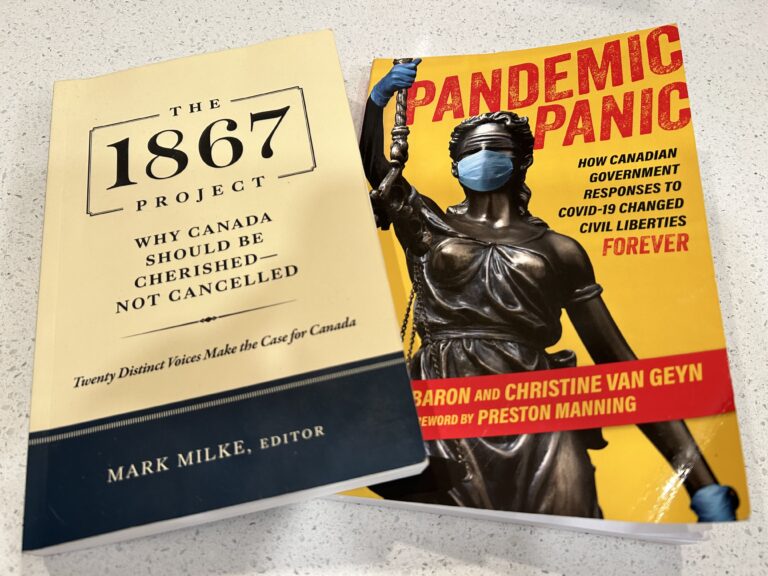Over the past little while I’ve read a couple of interesting books by Canadian authors on public policy.
If you’re interested in this genre, you might find these short reviews of interest:
The 1867 Project: Why Canada Should be Cherished – Not Cancelled
It has become fashionable among many activists in Canada to assert that our nation is a racist, intolerant country without much in the way of history to be proud of.
Such claims, of course, conflict with the fact that literally millions of people from all over the world have decided to move to Canada over the past century. (In 2022 alone, over a million people moved to our nation from abroad!)
Either all those people made a huge mistake or perhaps our nation isn’t the ‘breeding ground for hate’ that some claim. The authors behind The 1867 Project argue the latter.
Organized by Canada’s newest think tank, the Aristotle Foundation, The 1867 Project features 20 authors from across the country that examine Canada’s history from a more mature perspective than what you might find in mainstream media. The book recognizes that our nation, like every other country on earth, has a past that is not without its share of blemishes.
However, their thesis is that Canada is an organic project, a nation that has grown over the past century and a half, with each gain in civil rights building on past gains. Overall, they argue that our nation has trended in the right direction.
An excerpt from the intro articulates this quite well:
“Oddly, extreme revisionists expect Canada’s founders and others to have fully worked out the implications of their laudable liberty-seeking 19th century presumptions as if they lived in our century. But even reformist-minded men and women of previous eras had major battles to win before later generations could build on their successes. Those battles included “persuading” the few white slave-owners that still existed in the early 19th century Canada (or, in the case of some indigenous communities in British Columbia) that such practices were a moral abomination and should be abolished; that males without property, and then women, and then indigenous and minority Canadians were equal and deserved the vote and all rights more generally; that minorities as defined by religion, or colour, or ancestry deserved the chance to immigrate to Canada and the chance to succeed.”
While the book helps present Canada’s history and some of our historical figures in a more favourable light, the authors do have concerns with certain, for lack of a better word, “woke” aspects of Canadian society today. For instance, the book includes multiple chapters that take exception to critical race theory, identity politics and attempts to completely cancel figures from the past based on today’s standards.
Overall, I really appreciated the wide range of topics covered in the book and how the chapters were generally quite short (it was nice to be able to pick it up before bed and gain a quick briefing on topics I often wasn’t too familiar with).
Two thumbs up to those who contributed to this project.
To buy the book, see this Amazon link – click here.
Pandemic Panic
It’s hard to think of an event that has had more of an impact on Canadians’ lives over the past half century than the pandemic.
Governments racked up mountains of debt, thousands of businesses closed, our health care system faced tremendous strain and young students lost countless hours of class time. Needless to say, the consequences were broad and deep.
Despite this, many governments seem to want to just take everything related to the pandemic and throw it into the “memory hole” – as the authors behind Pandemic Panic note.
But shouldn’t governments want to conduct a wide assessment of what they did right, what they did wrong and what should be done differently? The answer is obviously yes, but the state has been slow to conduct such reviews.
Thankfully, Pandemic Panic offers a legal review of infringements to our civil liberties that arose during the pandemic.
Authored by the Canadian Constitution Foundation’s Joanna Baron and Christine Van Geyn, Pandemic Panic recaps various legal challenges that took place across the country. From vaccine passport challenges in British Columbia to the federal government using The Emergencies Act during the Freedom Convoy, the authors did a great job of explaining the issues, the government’s rationale behind such decisions (or lack thereof) and what the courts ultimately concluded – or didn’t in cases where the courts simply dismissed the cases.
The authors demonstrated that, more often than not, governments failed to restrict our freedoms during the pandemic using sound evidence and with careful precision. Throughout the book I was reminded of the old expression – “do not use a cannon to kill a mosquito.” For instance, if the goal was to prevent the spread of the virus in indoor settings where large numbers of people were present, then why clamp down on kids playing hockey outdoors and churches holding outdoor services?
Regardless of what one thought of provincial vaccine passports, common sense would dictate that if a patient had a serious reaction to their first dose, and their doctor urged against getting a second dose, that provincial policy should accommodate such cases. But as the authors note in chapter seven, such common sense often failed to reach the upper echelons of government, marginalizing select Canadians from participating more fully in society.
As a non-lawyer, I really appreciated how the authors presented the various legal cases in plain English (no need to Google complex legal terms!) I could pick the book up, read a chapter or two and come away with a better understanding of what occurred.
Throughout the book I found myself concluding that while I believed it was reasonable for governments to impose at least some sensible restrictions on our personal freedoms, time after time they failed to meet that threshold.
While the book was accessible for non-lawyers, as I read it, I kept thinking how it could be an excellent resource for a law school class that wanted to examine legal challenges and issues that arose during the pandemic period.
As much as we all may want to join governments in throwing the pandemic era into the memory hole, it’s good for citizens to learn more about what transpired and just how weak many of the governments’ arguments actually were.
Two thumbs up for this book too!
You can buy a copy of Pandemic Panic at local bookstores and through Amazon – click here.
-Colin Craig
President – SecondStreet.org
Share on Facebook
Share on Twitter
You can help us continue to research and tell stories about this issue by making a donation or sharing this content with your friends. Be sure to sign up for our updates too!








